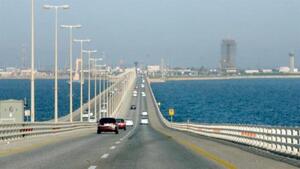Blog Information
- Publicado por : abdullah bin waheed
- Publicado en : May 29, 2025
- Puntos de vista : 56
- Categoría: Viajar
- Descripción: An in-depth look at the King Fahd Causeway Authority’s role in managing one of the Gulf region’s most critical infrastructures—exploring its current operations, smart technology integration, sustainability efforts, and ambitious future expansion plans, including the upcoming King Hamad Causeway.
Visión de conjunto
The King Fahd Causeway Authority plays a crucial role in connecting the Kingdom of Saudi Arabia and the Kingdom of Bahrain, facilitating not only transportation but also fostering economic integration and cultural ties between the two nations. Since its inauguration in 1986, the King Fahd Causeway has stood as a symbol of Gulf Cooperation Council (GCC) unity, and the authority responsible for its operation continues to lead with vision, efficiency, and technological advancement.
Historical Background and Strategic Importance
The King Fahd Causeway was envisioned as a monumental infrastructure project that would physically and symbolically bridge Saudi Arabia and Bahrain. Stretching over 25 kilometers, it has become one of the busiest land borders in the region. The King Fahd Causeway Authority was established to manage, operate, and maintain this vital link. Over the decades, the causeway has not only served as a transportation artery but also boosted trade, tourism, and cross-border employment.
With millions of vehicles crossing annually, the strategic importance of the causeway cannot be overstated. It enables smoother logistics for goods and services, offers shorter travel times between the two countries, and plays a major role in the economic dynamics of the Eastern Province of Saudi Arabia and Bahrain’s capital, Manama.
Infrastructure Excellence
The current infrastructure of the causeway includes dual carriageways, custom checkpoints, border control stations, and service areas. The King Fahd Causeway Authority has ensured that the physical infrastructure remains robust, secure, and well-maintained. The bridge itself comprises multiple connected sections, built over both land and water, supported by strong pilings and protected with modern safety systems.
Recent developments have included the reinforcement of structural elements, upgrading of vehicle inspection zones, and enhancement of lighting and road safety systems. The Authority consistently engages in preventive maintenance and routine inspections to ensure seamless operations, even during peak holiday travel seasons or special events.
Technological Innovation and Smart Systems
In recent years, the King Fahd Causeway Authority has embarked on a transformative journey by incorporating advanced technologies into its operations. From smart surveillance systems to automated toll collection, the causeway has become a model of digital transformation in border management.
Key innovations include:
-
E-Passport Integration: Integration with national e-passport systems for quicker immigration clearance.
-
Smart Traffic Management: AI-powered traffic monitoring and predictive analytics to reduce congestion and travel time.
-
Online Booking Systems: Travelers can now schedule their crossing times and receive real-time updates about border traffic and wait times.
-
Digital Toll Collection: Contactless payment solutions through mobile apps and smart cards have streamlined toll operations.
These innovations not only improve user experience but also enhance security and data collection, which helps in policy making and operational planning.
Environmental and Sustainability Efforts
As part of its forward-thinking approach, the King Fahd Causeway Authority has initiated several eco-friendly projects to reduce the environmental impact of its operations. These include solar-powered lighting systems, waste management programs at rest stops, and research into reducing vehicular emissions on the causeway.
Additionally, there is a focus on marine conservation in the areas surrounding the causeway. Environmental impact assessments are regularly conducted to ensure the marine life and ecosystem of the Arabian Gulf are preserved.
Expansion Projects and Future Outlook
To cope with increasing traffic and to further enhance economic collaboration between the GCC countries, the King Fahd Causeway Authority has announced several future expansion plans. The most prominent among them is the King Hamad Causeway, a parallel link that will incorporate both road and railway infrastructure.
This new project aims to:
-
Facilitate high-speed rail travel between Saudi Arabia and Bahrain.
-
Expand freight capacity.
-
Offer separate lanes for cargo and passenger traffic.
-
Boost regional connectivity in line with Saudi Vision 2030 and Bahrain Economic Vision 2030.
The King Hamad Causeway is expected to work in tandem with the existing causeway, significantly reducing traffic congestion and creating new economic zones on either side. The Authority is actively collaborating with private investors and international engineering firms to bring this ambitious vision to life.
International Cooperation and Security
Given its role as an international border, security remains a top priority. The King Fahd Causeway Authority works closely with both Saudi and Bahraini governments, as well as with international agencies, to maintain high levels of security. Enhanced screening technologies, coordinated emergency response plans, and cross-border intelligence sharing ensure that the causeway remains a safe transit point for all users.
Additionally, the Authority has been actively engaging with stakeholders from customs, immigration, and public safety departments to streamline the movement of people and goods, while minimizing risks related to smuggling, trafficking, or unlawful entry.
Conclusion
The King Fahd Causeway Authority stands at the crossroads of tradition and modernity, managing one of the most significant infrastructural assets in the Gulf region. Through its commitment to infrastructure excellence, innovation, sustainability, and regional collaboration, it continues to pave the way for a future where borders are not barriers, but bridges to shared growth.
As plans for expansion materialize and digital transformation deepens, the authority is set to remain a pivotal institution in the narrative of Gulf cooperation. Travelers, traders, and tourists alike will benefit from its ongoing commitment to providing efficient, safe, and smart services.
-
